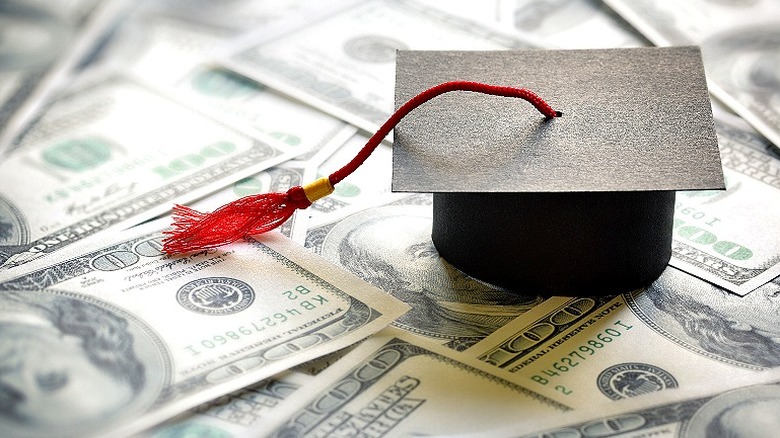Fact Check: Can You Use Employer 401(k) Matching To Pay Off A Student Loan?
Retirement is a looming concern for many Americans. A 2024 AARP survey found that over half of adults over 50 worried that they wouldn't have enough to last them once they retired, and 20% had no retirement savings at all. For younger Americans still working, it's a source of anxiety best avoided if possible. A retirement plan, such as a 401(k), is one way to avoid it, particularly when it's properly managed.
But at the other end of adult life, student loan debt is an increasingly large concern. These loans are a heavy financial burden on many young people, and the penalties for falling behind in student loan payments can be steep. But could someone kill two financial birds with one stone? Could a quirk of the 401(k) plan help one pay off student loans and put aside money for retirement? The IRS recently issued guidelines regarding the SECURE 2.0 Act of 2022, stating that employers can match contributions to 401(k) plans based on student loan payments as well as employee contributions, for plan years after December 31, 2023.
That isn't exactly the same as paying off a student loan with 401(k) matching. What it really means is: If you make a student loan payment every month, that payment can count as your "contribution" toward your retirement fund, which your employer will match. This lets you build toward retirement without having to put money in from your possibly tight budget on top of meeting your debt obligations.
Employers have discretion in matching student loan payments
As an illustration for what allowing employers to treat student loan payments as contributions to 401(k) and related plans could mean, The Wall Street Journal used the example of a worker who made $70,000 a year. If that worker put 5% of their annual income into their retirement plan, their employer could match it. Under the new guidelines published for the SECURE 2.0 Act, if that 5% went toward student loan payments instead, without any further contributions toward the 401(k), the employer could — and did, in this example — still put in 5% of its own into the plan, a $3,500 investment.
But it's important to note that the SECURE 2.0 Act didn't require employers to treat student loan payments as contributions toward retirement plans like a 401(k). It only created the option to do so. A company is within its rights to decline, and for the moment, many companies are. With the idea still being so new, there's little in the way of sample plans and guidelines for employers to follow. It's also unclear as of November 2024 if private student loans can qualify for this kind of matching.
Employees need to certify their student loan payments
Some employers are already offering to match student loan payments with 401(k) contributions; but, if they do, it puts some responsibilities on the benefiting employees. At the moment, qualifying loans are only specified insofar as they represent a loan taken out for the education of the employee, their spouse, or someone dependent on them. You would need to confirm the nature of your loan.
This means what The Wall Street Journal called "self-certifying." That is, you'll need to confirm to your employer that you've made a "qualified student loan payment" (or QSLP, per the IRS) that your employer can match. There aren't set guidelines for how to do this as of yet, meaning that it's likely to vary depending on who you work for.
All of this is assuming that using the new student loan policy is the best option for you. There are maximum contribution limits on 401(k) retirement plans. If your student loan payments exceed that limit, and you can afford it, you might be better off putting money toward your retirement plan yourself to earn your employer's matched contributions.
Also, keep in mind that if you don't contribute to your 401(k) yourself, opting instead to pay down your student loan(s), you run the risk of losing out on your employer's contributions if you leave the company before the matched money fully vests. Vesting schedules are typically three to five years. (Find out what would be a good rate of return for a 401(k)).


